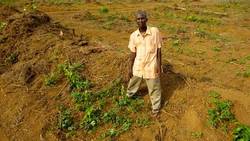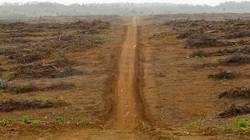The Globe and Mail | 27 September 2012
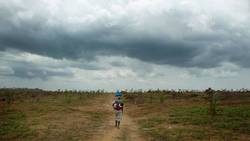
A woman walks through an area only metres from her village of Nimba Point in Liberia that was forest and farmland only a few months ago. Residents are now faced with adjusting from an agriculture-based economy to a wage economy, although contracts concerning compensation are still being disputed. (Photo: Peter Power/The Globe and Mail)
by GEOFFREY YORK
As he walks through the denuded remains of his farm, Kandakai Blasuah points to the marshland where he used to fish. It’s now dry, filled with sand.
The bush where he gathered medicinal herbs is also gone. His farm, too, has vanished. All that’s left are a few rows of corn, and a new road to serve the vast palm plantation that has enveloped his village for the past two years.
“When I was born and opened my eyes, I saw this land,” he says. “I used to have a good life. We had cassava, bananas, plantain, peppers, aloe – but they took it all away.”
From a nearby hilltop, Mr. Blasuah gazes out at the plantation. In every direction, the fields have been stripped of trees and crops. Some are already filled with palm seedlings, planted by Sime Darby, the Malaysian company that took a 63-year lease on the land in 2009.
“It’s such a big area, and we are suffering,” he says. “I feel like hell, because there’s no more land and there’s no place for me to go.”
This 220,000-hectare palm plantation in northwestern Liberia is just one of a dramatic new wave of commercial land investments – “land grabs” to some – that is sweeping across Africa. Over the past 12 years, almost 5 per cent of Africa’s agricultural land has been purchased or leased by investors. One database lists more than 750 land deals in Africa since 2000, covering more than 56 million hectares, a territory far bigger than most European countries.
Some observers call it “the second scramble for Africa” – an echo of the 19th-century colonial carve-up of the continent. Thousands of ancestral farming plots across Africa have been handed over to corporate interests, usually for forestry, mining or agri-business. The deals have accelerated since 2008, when global food prices soared to peak levels.
The farmers and herders who traditionally use the land are often squeezed out because they lack formal title to property, which is usually held communally. Sometimes they don’t even realize their land has been sold or leased until the bulldozers arrive.
Since the land is officially state-owned, it is the government that usually negotiates with the investors, often shrouding the deals in secrecy. The results are private deals that may be lucrative to governments but are unfair to the local people. Some jobs may be created in the commercial land projects, but they tend to be short-term or seasonal contracts.
Tens of thousands of villagers have already been forcibly evicted from their land in countries like Uganda, Ethiopia, South Sudan and the Democratic Republic of Congo. In one case, a Norwegian investor reportedly obtained a 99-year lease on 179,000 hectares in South Sudan for just 7 cents a hectare annually.
“Too many investments have resulted in dispossession, deception, violation of human rights, and destruction of livelihoods,” the aid agency Oxfam said in a recent report on land grabs.
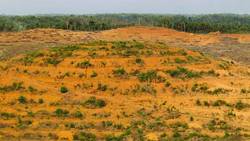
This image shows a very small part of the clear cutting that has been done by the Malaysian company Sime Darby northwest of Monrovia, Liberia on April 25, 2012. The company owns concessions to 220,000 hectares of land that will be used for the production of palm oil. Communities in the area are not happy with the payments made to individuals, and/or communities, and are suffering in many cases because the clear cutting has isolated communities, destroyed crops, and destroyed, or polluted water sources. (Peter Power/The Globe and Mail)
In Liberia, the government has granted about half of the country to investors, usually on long-term leases. Nearly 6 per cent of Liberia’s total land mass has been leased to palm-oil companies alone. More than a million people live on those lands, and 150,000 will be affected in the first five years of the plantations, local activists say.
Palm oil, a vegetable oil used in hundreds of products from margarine to cosmetics, has become highly profitable, with global demand fuelled by the growth of processed food and biofuels. Its world price has tripled in the past decade, and demand is expected to double again by 2020.
Sime Darby, a diversified company that has become the biggest conglomerate in Malaysia and the world’s largest plantation company, has grand dreams for this war-ravaged African country. Its billboards trumpet the arrival of a “New Liberia” – a shining nation of prosperity and growth.
Sime Darby has promised to create an agribusiness industry in Liberia that will rival anything in Asia. It says its planned $3.1-billion investment has already produced 3,000 jobs and will eventually create 35,000, paying nearly double the minimum wage.
The company’s vision seems utopian. For every 3,000 hectares of its plantation, it pledges to build a new village – complete with a school, health clinic, daycare centre, church or mosque, alongside hundreds of housing units. More than 40 such villages are promised within the next 15 years.
Yet the reality, so far, has been distinctly dystopian. Angry villagers accuse Sime Darby of cutting a private deal with the government and failing to consult them. Last December, they rioted against the company, seizing its bulldozers and blocking the plantation project. They say their crops are gone and their sacred lands are desecrated. The jobs, they say, are too few and too poorly paid, especially now that they’re forced to buy their food in the marketplace rather than growing it.
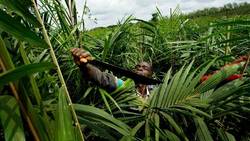
A worker trims the tops off of palm seedlings in the nursery area of the Sime Darby plantation northwest of Monrovia, Liberia on April 25, 2012. Because of a delay in developing new planting areas, these seedlings have been growing longer than they should, and would be too unwieldy to transplant if not trimmed first. (Peter Power/The Globe and Mail)
The company and the government, admitting blunders on the project, temporarily halted the development in January and promised to improve it. “Everybody made mistakes on this,” Liberian President Ellen Sirleaf Johnson told the villagers. “More consultations and more talks with the people should have taken place.”
Sime Darby freely uses the term “crisis” to describe its relations with the Liberian villagers. It admits it made errors in clearing its first 4,400 hectares, failing to set aside enough land for the villagers. “There is some truth in what they’re protesting,” says Mohammed Zulkifli, a land development official at Sime Darby.
Mr. Zulkifli says the company relied on the government to decide how much land to allocate to the villagers. And he promises to correct the missteps. “If they want a bigger share of land set aside for the farms, we’ll move ahead with that.”
Most villagers were given lump-sum payments for their land. But they say it failed to compensate for their lost income.
“When someone offers them a lump sum of a few hundred dollars, it seems like a good deal until the money runs out and they realize they’ve got nothing to fall back on,” said Ashoka Mukpo, who researched a Liberian land study for Columbia University’s Center for International Conflict Resolution. “The rates of compensation are a tiny fraction of their net worth.”
In Nimba Point village, Mr. Blasuah says he received just $130 for his two-acre farm, which contained 335 pepper plants, along with eggplant and cassava crops. Now he works for the company as a contractor, getting 3 cents for every hole that he digs for a palm seedling. It adds up to about $500 a month – less than what he earned from his farm.
In the village of Senii, only 13 people got jobs or contracts at the plantation, according to the chief, Abraham Turay. The village is so desperate that its school ended up closing, he said. “We have no work and no money, so we can’t pay the teachers and they all went away.”
And employment with the company is no sure thing. When contractors protested against the company’s conduct last year, hundreds were sacked from their jobs.


